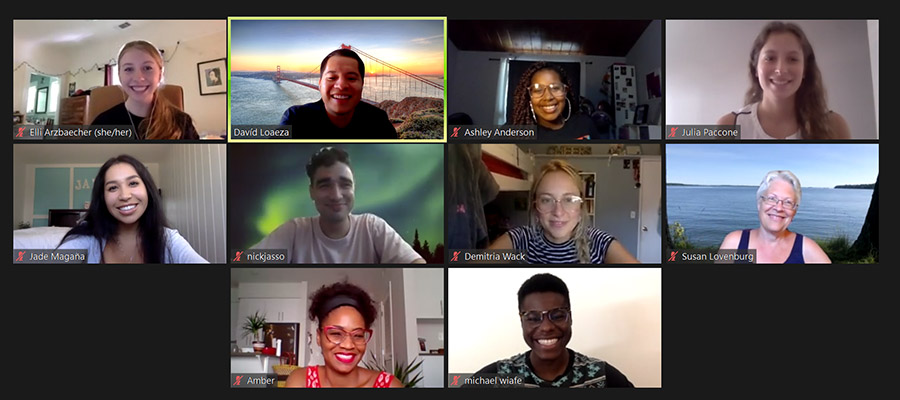Despite Gen Z making up an increasing number of eligible voters this year and millennials being the largest generation in the U.S. labor force, both groups remain severely underrepresented in all levels of government. In California, there are no members of the Assembly under 30. Many young voters have found that their issues are not being addressed at any level by the government. This is particularly concerning because Gen Z is considered to be among the most economically hard-hit by COVID-19. California Forward (CA Fwd) is working to mend these growing generational gaps by integrating youth participation in the 2020 California Economic Summit.
“As those with the largest stake in California’s future, it is critical that youth engage to help shape the policy agenda of the California Economic Summit,” said, Susan Lovenburg, COO of CA Fwd and executive director of the Summit.
The overwhelmingly positive response to the youth panel at the 2019 California Economic Summit revealed untapped enthusiasm for progress among young Californians, as well as a critical gap in the standard approach to policymaking. This year, CA Fwd created the Young Leaders Advisory Council. The Council consists of 20 young Californians from diverse backgrounds across the state who aim to increase activation in policy discussions among younger generations. They will have the opportunity to support even greater youth participation at the 2020 California Economic Summit by contributing directly to workgroups.
The Summit will be held virtually this year and it serves as a tremendous opportunity to showcase the value and the impact of youth engagement in a wide range of policy areas. While the learning curve in moving toward a fully virtual environment may have been less steep for Generation Z, they are more likely to be laid off or experience challenges finding a job than their generational elders. These challenges have seismic impacts on the future of this generation and the broader economy. Despite these obstacles, the Young Leaders Advisory Council members are focused on creating strong, long-lasting partnerships across the state to build out the current youth leadership infrastructure to support generational solutions.
The workgroups at this year’s Summit will focus on a range of issues including housing, increasing community investment, strengthening minority-owned businesses and much more. Integrating Council members into these workgroups is one of many steps CA Fwd is taking to ensure a more equitable and resilient future for all Californians.
 It’s not enough to be considered the “leaders of tomorrow.” Young people must be a part of local, regional and statewide conversations today. The world today looks very different from the world many of the state’s legislators grew up in and COVID-19 has drastically changed the world since the beginning of this year. The Council is working to increase engagement and representation as institutions throughout the state work to build more equitable and resilient communities in the wake of the pandemic.
It’s not enough to be considered the “leaders of tomorrow.” Young people must be a part of local, regional and statewide conversations today. The world today looks very different from the world many of the state’s legislators grew up in and COVID-19 has drastically changed the world since the beginning of this year. The Council is working to increase engagement and representation as institutions throughout the state work to build more equitable and resilient communities in the wake of the pandemic.
Without proper representation, valid and relevant views of the youth and young adults are overlooked. The lack of representation coupled with the misconception that young people are apathetic about politics or that their beliefs are naive are an impediment to intergenerational collaboration and long-term solution building.
“Young people are not absent-minded,” said Ashley Anderson, a recent high school graduate and representative of the Council from Los Angeles. “We are very knowledgeable about the things going on around us. Democracy works when we listen to different voices and opinions. If we don’t involve the youth, then a critical voice is missing.”
Though absent in the political arena, these young voices are sounding the alarm and making themselves heard. This point has been on full display as young people have taken to the streets to protest racial violence in the wake of the recent murder of Ahmaud Arbery and the state sanctioned killings of George Floyd, Breonna Taylor, and many others.
“It’s an important time to take advantage of the momentum young people have right now in terms of civic engagement and political power,” said Tim Haydock, director of communications for the Youth Leadership Institute and director of the youth panel at the 2019 California Economic Summit. “The Council is a statement that California cares about the future of the state and how young people are going to shape it.”
Recognizing the long-standing pattern of delayed youth engagement, the Young Leaders Advisory Council is working with the 2020 California Economic Summit to bridge the political generation gap and to fulfill the state’s commitment to an inclusive democracy.
| Demetria Wack is a member of the Young Leaders Advisory Council for the 2020 California Economic Summit to be held on December 3-4. She graduated from California State University, Fresno this year, earning her B.A. in Psychology. She also serves as the Region 5 Coordinator for the Office of the Governor’s California Volunteers program and continues to lead on issues related to community engagement and collective action. |  |
| Raquel Robeson is a supporter of the Young Leaders Advisory Council for the 2020 California Economic Summit to be held on December 3-4. She recently graduated from San Francisco State, earning her degree in Communication Studies. Her community activism has enabled her to help normalize and educate others on gender and non-binary discourse. Her policy interests revolve around equality and representation of minority communities. |  |

